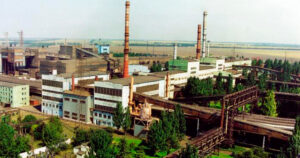Geographical structure of Ukraine’s foreign trade (exports) in January-May 2025, million USD

Source: Open4Business.com.ua

Retail trade turnover in Ukraine increased by 6% in January-September 2025 compared to the same period in 2024, according to the State Statistics Service (SSS).
According to its data, in nominal terms, retail trade turnover in January-September of this year amounted to UAH 1.892 trillion.
Retail trade turnover in September decreased by 4.8% compared to August of this year, but in annual terms, it increased by 7.1% compared to September 2024.
The State Statistics Service specifies that the turnover of retail trade enterprises (legal entities) in January-September 2025 increased by 5.5% compared to January-September 2024 and amounted to UAH 1.310 trillion.
At the same time, in September compared to August of this year, the retail turnover of enterprises decreased by 4.6%, and compared to September of the previous year, it increased by 6.4%.
According to the statistics agency, Ukraine’s retail trade turnover in the first half of 2025 grew by 6.3% and amounted to UAH 1.213 trillion in nominal terms.
The State Statistics Service notes that the data does not include territories temporarily occupied by the Russian Federation and parts of territories where hostilities are (were) ongoing.

Deputy Head of the Department for Financial Technologies, Digitalization and Artificial Intelligence of the Presidential Administration of Uzbekistan Hikmatilla Ubaidullaev said that the first working meeting with OpenAI representatives was held. Valerie Fokke, Dips Patel, Shaig Ali, and Carlotta Serrano, Heads of Education and Partnerships, participated in the meeting.
The main topic of the talks was the introduction of ChatGPT EDU platform for teachers and students. This tool will allow using powerful OpenAI language models in a secure environment, creating personalized learning materials and own AI assistants.
The parties paid special attention to personalized learning, where artificial intelligence helps to adapt the educational process to the individual characteristics of each student, such as their pace, level of knowledge, and interests. Such a system will allow teachers to quickly identify gaps, create individualized assignments, automate work checking, and reduce bureaucratic procedures.
It was agreed that OpenAI will not create a separate program but will join the national initiative 1 Million AI Leaders, supplementing it with its own courses and expertise. This will allow Uzbek schoolchildren, students, and teachers to master artificial intelligence technologies at the level of world standards.
A separate area of discussion was the support of local startups. OpenAI expressed its readiness to consider providing preferential access to APIs and loans, as well as participation in hackathons and acceleration programs in Uzbekistan. This will create additional opportunities for young teams developing their own AI products in education and business.
The Uzbek side also presented plans to create a GPU cluster and an Uzbek-language data corpus for localization and adaptation of AI models. OpenAI representatives noted that their systems already demonstrate a high level of understanding of the Uzbek language and expressed interest in further cooperation in this area.
Following the meeting, the parties agreed to prepare a roadmap for cooperation in three key areas:
1) implementation of ChatGPT EDU at universities;
2) development of mass AI education;
3) support for startups and hackathons.

The Kryvyi Rih Mining and Metallurgical Plant PJSC ArcelorMittal Kryvyi Rih (AMKR, Dnipropetrovsk region) increased its net loss by 11.9% in January-June this year compared to the same period last year, from UAH 3 billion 769.944 million to UAH 4 billion 219.136 million.
According to AMKR’s interim report, net income in the first half of 2025 decreased by 10.4% to UAH 33.818 billion from UAH 30.621 billion.
The uncovered loss at the end of June 2025 reached UAH 28 billion 162.682 million.
According to the AMKR annual report, in 2024, the company reduced its consolidated net loss by 25.5% compared to 2023, to UAH 8 billion 841.812 million from UAH 11 billion 875.984 million. At the same time, net income decreased by 54.3% to UAH 64.599 billion from UAH 41.873 billion. Retained earnings at the end of 2024 amounted to UAH 24.039 billion.
As reported, AMKR ended 2022 with a net loss of UAH 49.9104 billion, while in 2021 it received a net profit of UAH 25.282951 billion.
ArcelorMittal Kryvyi Rih is the largest producer of rolled steel in Ukraine. It specializes in the production of long products, in particular, rebar and wire rod.
ArcelorMittal owns Ukraine’s largest mining and metallurgical complex, ArcelorMittal Kryvyi Rih, and a number of small companies, including ArcelorMittal Beryslav.

In 2024, PJSC Nikopol Ferroalloy Plant (NFP, Dnipropetrovsk region) increased its net loss by 15.9% compared to 2023, from UAH 2 billion 620.399 million to UAH 3 billion 35.966 million.
According to NZF’s annual report, net income for the past year decreased by 17.7% to UAH 7 billion 813.056 million from UAH 9 billion 493.059 million.
Retained earnings at the end of 2024 reached UAH 4 billion 128.280 million.
As reported, in January-June of this year, NZF reduced its net loss by 69.6% compared to the same period last year, to UAH 458.274 million from UAH 1 billion 505.962 million. In the first half of 2025, NZF increased its net income by 11.7% to UAH 3 billion 915.368 million from UAH 3 billion 505.483 million. Undistributed profit at the end of June 2025 reached UAH 3 billion 778.047 million.
In 2020, the company received a net profit of UAH 456 million 162,764 thousand. In 2021, the company received a net profit of UAH 5 billion 139 million 528,911 thousand. In 2022, NZF received a profit of UAH 910 million 452,147 thousand.
The plant ended 2023 with a net loss of UAH 2 billion 620 million 398,599 thousand.
In addition, it was reported that the Pokrovsky Mining and Processing Plant (PGZK, formerly Ordzhonikidze Mining and Processing Plant) and the Marganetsky Mining and Processing Plant (MGZK, both in Dnipropetrovsk region), which are part of the Privat Group, ceased the extraction and processing of raw manganese ore at the end of October-beginning of November 2023, while NZF and ZZF stopped smelting ferroalloys. In the summer of 2024, ferroalloy plants resumed production at a minimum level.
The business of ZZF, NZF, Stakhanovskyi ZF (located in NKT), Pokrovskyi and Marganetskyi GZK was organized by Privatbank prior to nationalization.
NZF is Ukraine’s largest producer of silicon and ferromanganese. The average monthly output of ferroalloys during stable operation of the enterprise is about 55-60 thousand tons.
According to NDU data for the first quarter of 2025, Sofalon Investments Limitad owns 15.503% of the shares of the private joint-stock company, Rougella Properties Ltd. owns 9.6904%, Dolemia Consulting Ltd. owns 15.7056%, Sonerio Holdings Ltd. holds 9.2158%, Manjalom Limited holds 5.8824%, and Treelon Investments Limited (all based in Cyprus) holds 15.1013%.
The authorized capital of PJSC NZF is UAH 418.915 million.
NZF is controlled by the EastOne group, created in the fall of 2007 as a result of the restructuring of the Interpipe group, as well as the Privat group (both based in Dnipro).
FERROALLOY, LOSS, NIKOPOL, PLANT, НЗФ

In Ukraine, prices for the resource rose in November, with 9.7 million cubic meters sold. In Europe, spot prices were around €32/MWh, with volatility driven by weather forecasts, sanctions (the 19th EU package), and lower production in Norway. EU underground gas storage facilities were filled to 82.82% of their technical capacity, while Ukraine accumulated over 13 billion cubic meters and began the withdrawal season.
Last week, trading continued for October and November 2025 resources. In general, positions for the purchase and sale of natural gas were formed by the following companies: Ukrnafta, Energo Zbut Trans, Tepla Energetichna Kompaniya, SP BNK, etc.
Starting prices for resources rose during the week. As a result, as of Friday, the average starting price of November resources in the GTS was 3.45% higher than on Monday and amounted to UAH 23,425 excluding VAT.
Tepla Energetichna Kompaniya entered the auction with an offer to sell imported natural gas in the section of the same name with delivery in November to the GTS.
During the past week, only positions for sale were sold. A total of 9,700 thousand cubic meters of natural gas was sold (+28% from the previous week). This entire volume was sold by Ukrnafta – November resource in the UGS. In general, the prices of positions sold last week ranged from 21,085 to 21,415 UAH/thousand cubic meters excluding VAT, which is more than 1,000 UAH higher than the prices of the previous week.
On the short-term natural gas market of the UEB, participants formed bids on the intraday market in the GTS and UGS. In total, agreements were concluded for a total volume of 396 thousand cubic meters (-25% compared to the previous week). By October 24, the weighted average price of KSP had increased by +7.3% compared to October 17.
Last week, geopolitics continued to make headlines but offered little certainty. While on Wednesday, futures for the coming month on gas markets fell by ~2% amid forecasts of higher temperatures in the UK and Europe, which signaled restrained gas demand in November, on Thursday they rose, coinciding with the confirmation of the 19th package of EU sanctions, which will ban imports of Russian LNG from 2027, adding a small premium for geopolitical risk on European hubs. Additionally, this trend is driven by rising domestic demand and reduced production in Norway following the temporary closure of the Oseberg field.
The British gas market followed the European market on Thursday after the US announced sanctions against Lukoil and Rosneft, Russia’s two largest oil companies. Gas prices in the US rose to $3.46 per million BTU, which is 20% higher than the lows recorded on October 17. The continuation of the upward trend in US gas prices could lead to higher LNG prices and increased delivery costs during the winter.
Prices of contracts with delivery in the corresponding period, EUR/MWh, 24.10.2025
Instrument THE CEGH TTF TGE/POLPX Average value
Day1 33.31 34.83 32.42 39.68 35.06
M+1 33.519 34.75 32.44 38.30 34.75
Q +1 33.94 34.99 32.78 38.58 35.07
S +1 32.12 33.96 30.91 36.42 33.35
Contracts for the month ahead on all analyzed hubs showed a different trend compared to spot prices, falling by an average of 0.75%. Quarterly forward prices were on average 0.17% higher than spot prices. Seasonal forward prices, with an average value of €33.35/MWh, tended to be 4.73% lower than spot prices on average.
The US sanctions coincide with the EU’s decision to implement the 19th package of sanctions against Russia, terminating all short-term LNG supply contracts within six months and completely banning Russian LNG from January 2027, one year ahead of schedule.
Further along the curve, prices fell on Friday morning for most contracts, with declines observed from the summer Sum-26 contract to the winter Win-28 contract, indicating that the previous price increase may have been driven mainly by short-term fundamentals.
EU gas storage levels fell to 82.82% on October 22, which is 9% below the 5-year average. The situation with storage facilities in the EU has remained unchanged for a month and is holding at 82%. There are two competing factors behind this static indicator: last week, gas demand in Europe exceeded seasonal expectations by more than 10%, but LNG supplies have already reached the level of the first half of this year. Europe is likely to enter the heating season with the lowest storage levels since 2015 and has recorded its earliest week of net withdrawal since 2020.
The December LNG futures contract in Asia, the JKM Platts Future index, settled at $403.29 per thousand cubic meters on October 23. Futures for LNG supplied to North-West Europe (LNG North West Europe Marker) closed at $375.36/thousand cubic meters.
European LNG receiving terminals operated at an average capacity of 51.0% on October 22.
LNG stocks in the EU as of October 22, 2025, amounted to 4.874 million cubic meters of LNG, according to Aggregated LNG Storage Inventors.
Natural gas imports from Europe averaged 15 million cubic meters per day (-8 million cubic meters compared to the previous period) with significant fluctuations during the week. Imports came from Slovakia, Hungary, and Poland. Imports from Poland fluctuated significantly due to repair work. Hungary was the main source of imports. There were no exports. Ukraine’s storage facilities held about 13.1 billion cubic meters of natural gas, roughly the same as last week. On October 22, 1 million cubic meters of natural gas was withdrawn from underground storage facilities.
Source: https://expertsclub.eu/oglyad-czin-na-gaz-v-ukrayini-ta-yevropi/